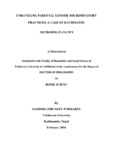Please use this identifier to cite or link to this item:
http://archive.nnl.gov.np:8080/handle/123456789/196| Title: | UNRAVELING PARENTAL GENDER DISCRIMINATORY PRACTICES: A CASE OF KATHMANDU METROPOLITAN CITY |
| Authors: | POKHAREL, SAMIDHA DHUNGEL |
| Keywords: | Gender discrimination, Parent, Child, Identity, Coping strategy |
| Issue Date: | 25-Mar-2019 |
| Abstract: | The overall objective of this dissertation is to explore and analyzed parental gender discriminatory behavior and children‘s coping strategy against it. Findings rely on the data collected from a total of three hundred and ninety-five (395) respondents (parents having children from birth to nineteen years old, and teenage boys and girls) residing in Kathmandu metropolitan city through a mixed model. Parental gendered perception and practice is highly influenced by gender, educational status and economic condition. Parents show gender differentiated attitude from the very beginning of child‘s birth and put into practice while providing health facilities, breast feeding/weaning, quality education, decision making, household labor distribution, etc. Teenage boys and girls feel more discrimination in the area of mobility, household job responsibility and education. Boys identify themselves as confident, defiant, supporter and progenitor while girls as rejected, docile, suppressed and confused. More girls than boys feel discrimination at home. More boys than girls choose problem solving coping strategies. More girls than boys on the other hand, use emotion focused coping strategies. It can be concluded that parental gender discriminatory behaviors is not an issue for girls only but also for boys. Like other societal discrimination parental gender discriminatory behavior is embedded with: parental stereotypical perception attached with boys and girls, identity formation, and types of strategies chosen by teenagers to cope against it. Parental attitude that is expressed in behavior help boys and girls to internalize that they are different to each other based on their biological sex and accept stereo typical gender role. Gender awareness programs at school would benefit boys and girls to resist parental gendered v behavior effectively. Moreover, improvement in parental educational and economical condition would be helpful in lessening gender discrimination. |
| URI: | http://103.69.125.248:8080/xmlui/handle/123456789/196 |
| Appears in Collections: | 300 Social sciences |
Files in This Item:
| File | Description | Size | Format | |
|---|---|---|---|---|
| Unraveling Parental Gender Discriminatory Practices.pdf | 1.87 MB | Adobe PDF |  View/Open |
Items in DSpace are protected by copyright, with all rights reserved, unless otherwise indicated.